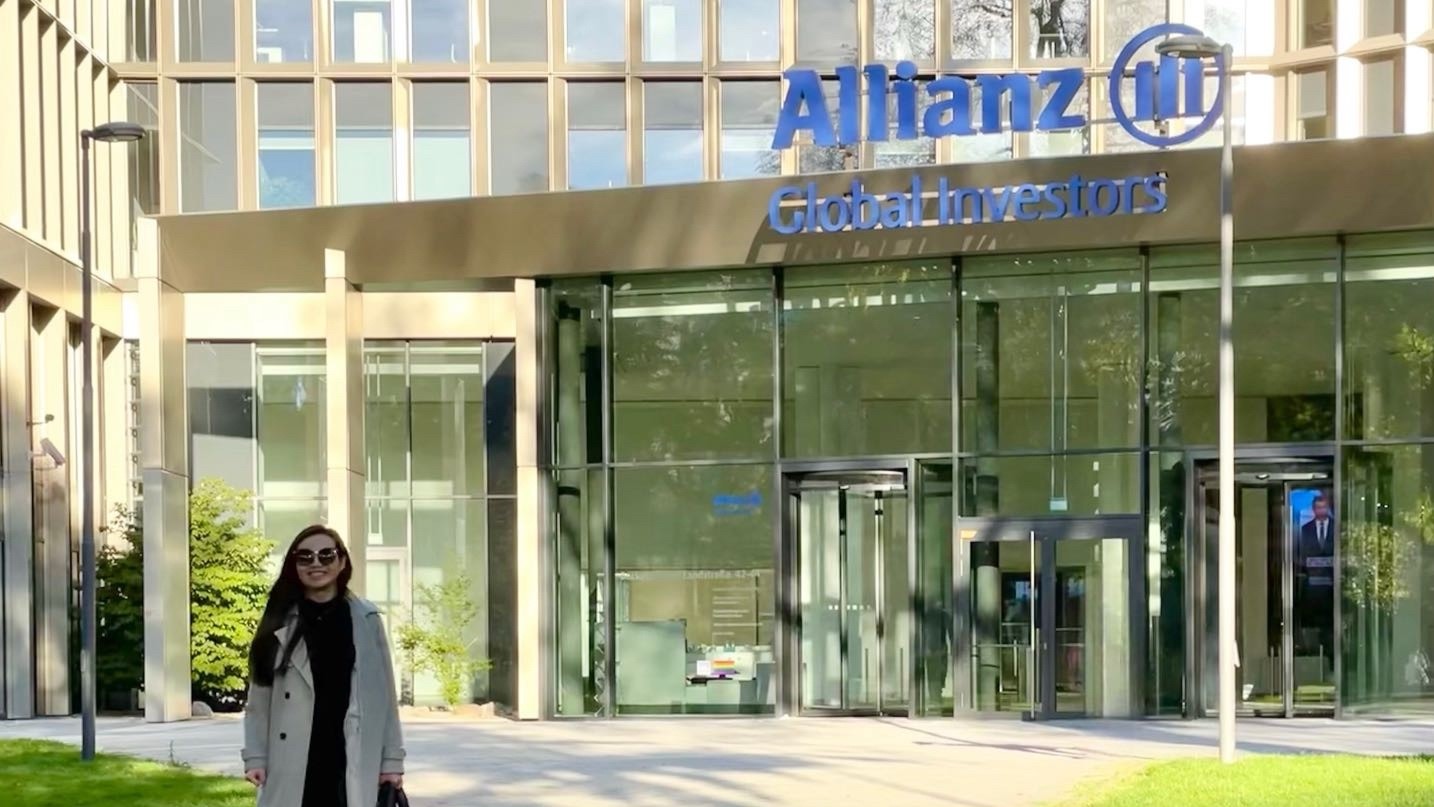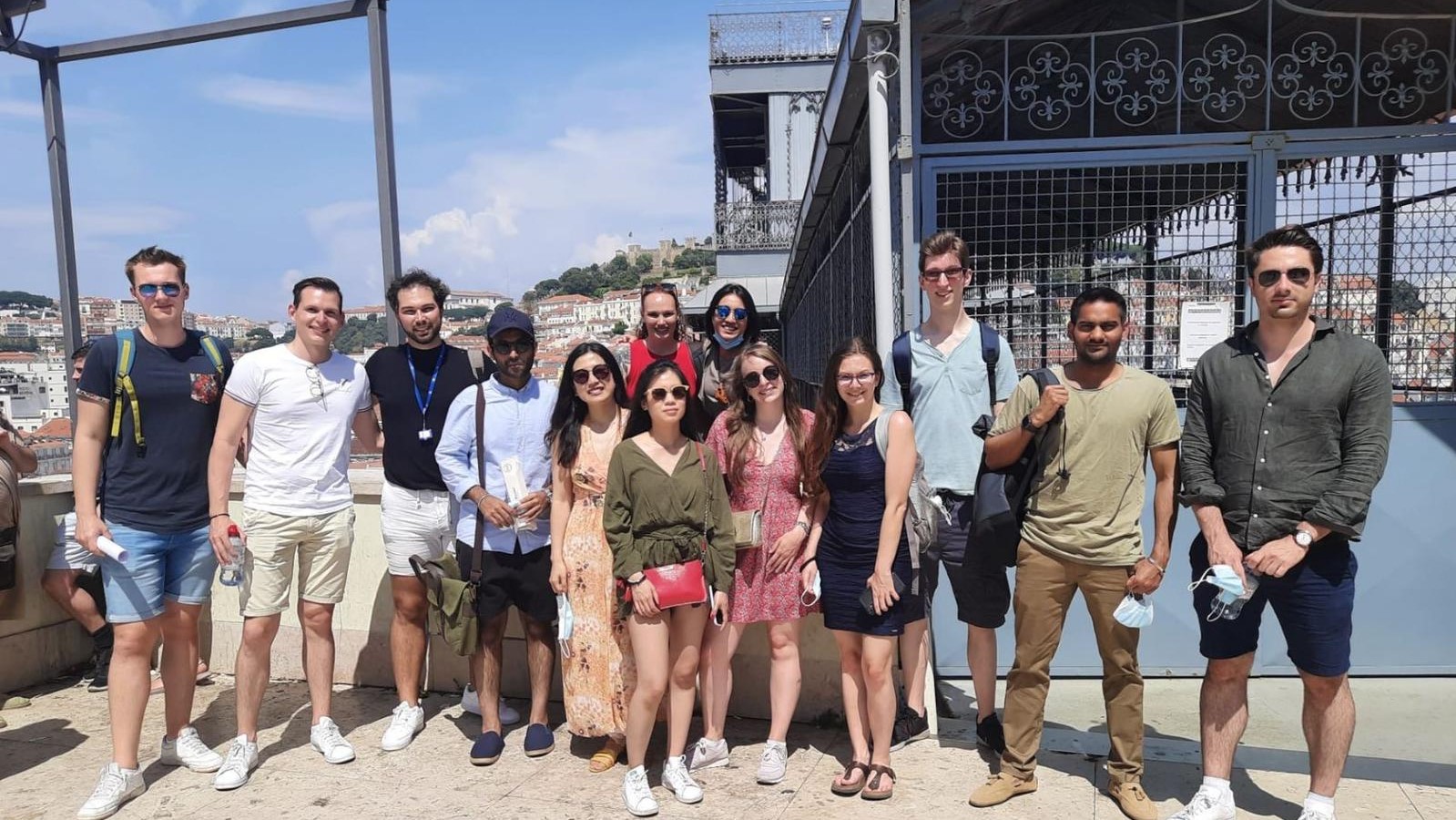"jcr:90e84d2d-e7a6-47df-a0a4-1ea8fa2c0557" (String)
Choose your language
Master of Finance

120ECTS
*excl. 400 EUR enrolment fee and 100 EUR application fee
The Master of Finance programme is ideal for recent graduates and young professionals aspiring to become finance experts. Partnered with CFA and CAIA, it offers a robust finance education with practical insights.
The programme's flexible structure allows for part-time employment through its innovative 3 Day Model, while students immerse themselves in an MBA-style learning environment.
Students can delve into the Entrepreneurship Accelerator or Incubator for personalised mentoring, and experiencing life in the vibrant city of Frankfurt adds a unique dimension to their journey.
Master of Finance Learning Goals
LG1: Expert Knowledge and Understanding in Finance
Graduates will draw upon expert knowledge and broad, detailed and critical understanding of specifics, limitations and doctrines in different areas of finance to shape responses and independent ideas to business and research opportunities and challenges. They will be able to analyse, structure and evaluate complex financial problems.
LG2: Financial Product Development
Graduates will generate insights by applying scientific methods. Our graduates will be able to conceptualise and develop financial products, solutions and models.
LG3: Effective Communication and Cooperation
Graduates will be effective communicators in interdisciplinary fields of research and practical business contexts. They will be responsible team members and reach common goals by effective cooperation within a team. They will recognise potential conflicts in cooperation with others and reflect on them in the context of situation-overlapping conditions.
LG4: Professional and Responsible Behaviour
Graduates will have developed a professional identity within the financial sector. They will recognise and respect the personal and cultural differences in an international business environment. They will understand and reflect on the ethical and societal implications of their recommendations and business decisions.
Rankings & Accreditations
The Master of Finance was the first Masters degree offered by Frankfurt School and to this day, it remains our largest postgraduate programme. This flagship programme is featured in the world´s top ranking for business schools: the Financial Times pre-experience Masters in Finance ranking.

- Ranked #32 worldwide
- Ranked #2 in Germany
- Ranked #16 in Salary worldwide
- Ranked Top 23 worldwide for Career Services

Frankfurt School is one of the best European Business Schools. Accredited by AACSB, EQUIS and AMBA, the three leading international associations of business schools, Frankfurt School is one of the few institutions worldwide, which has been awarded the so-called "Triple Crown".
Partners
GARP and the Financial Risk Manager (FRM®) Exam
The Master of Finance, with the Risk Management concentration and the Master in Risk Management & Regulation are the first programmes in Germany to be accredited by GARP as covering at least 70% of the body of knowledge of the Financial Risk Manager (FRM®) Part I examination.
They further cover a large part of the FRM® Part II examination. This demonstrates that our students acquire the skills and techniques required by the global risk management profession. One elective module may be waived for Master of Finance students who have passed the FRM Part I exam. Students should submit their application for waiver to programme management by deadlines provided during the course of studies.
CFA University Affiliation Programme
Frankfurt School´s Master of Finance is a member of the CFA Institute University Affiliation Programme. This status is granted to institutions whose degree programme(s) incorporate at least 70% of the CFA Programme Candidate Body of Knowledge (CBOK), thus providing students with a solid grounding in the CBOK and thoroughly preparing them for the CFA exams.
Recognition of CFA achievements
Up to two elective modules may be waived for Master of Finance students who have passed the CFA Level I exam and/or are selected to participate in the CFA Research Challenge. Students will need to submit their waiver application to programme management by the deadlines provided during the course of studies. More information on the CFA Institute University Affiliation Program
CFA Institute Research Challenge
Frankfurt School is proud to have participated in the CFA Institute Research Challenge for six years running. The annual global competition provides university students with hands-on mentoring and intensive training in financial analysis, testing analytics, valuation, report writing and presentation skills.
Master of Finance students at Frankfurt School have the opportunity to participate in the prestigious CFA Institute Research Challenge. This global competition allows students to conduct in-depth company analyses, develop investment recommendations, and present their findings to a panel of esteemed CFA charterholders, gaining valuable experience and insights into the world of finance.

The University Affiliation Program is a registered trademark owned by CFA Institute
Frankfurt Institute for Risk Management and Regulation (FIRM)
FIRM is supporting our Master of Finance students with a number of generous scholarships. Candidates applying for this specialisation may be awarded a scholarship covering up to two semester fees. In addition to that members of this concentration will have the opportunity to win the monetary Risk Management award, which will be presented during the graduation ceremony.

CAIA Association
Students have access to the Chartered Alternative Investment Analyst Association®'s curriculum in order to successfully become a Chartered Alternative Investment Analyst (CAIA). This includes scholarships for the CAIA exam – Level I and Level II, access to the Center for International Securities and Derivatives Markets (CISDM) Hedge Fund Database as well as to publications of the CAIA Association.
In Germany, Frankfurt School is the first business school that partners with the CAIA Association. Upon signing, FS became the 16th partner university from the EMEA Region, joining many other internationally top-ranked institutions such as the University of St. Gallen and the IE Business School.
CHOM CAPITAL Sustainable Impact Diversity Scholarship
CHOM CAPITAL is proud to support exceptional students in the Sustainable Finance concentration, who not only excel academically but are also deeply committed to sustainability initiatives and corporate social responsibility.

Bloomberg Experiential Learning Partner
Within the Financial Products & Modelling module students are expected to utilise the resources in our Finance Lab and to complete the Bloomberg Markets Concepts (BMC) tutorial, which is a 10-hour, self-paced e-learning course that provides an interactive introduction to the financial markets. BMC consists of 5 modules - Economic Indicators, Currencies, Fixed Income, Equities and Getting Started on the Terminal - woven together from Bloomberg data, news, analytics and television.
Master of Finance Curriculum
The Business Track is designed for students with a background in finance, offering a first semester that covers a range of topics while reinforcing key competencies essential for the programme.
The Finance Immersion Track is tailored for students without a finance background, equipping them with fundamental finance and business skills through a blend of academic lectures and hands-on tutorial sessions.
Starting in the second semester, both tracks merge, allowing all students to build on their foundation before selecting one of the six concentrations.
Concentrations
Our Master of Finance concentrations are designed to provide specialised knowledge and skills focused on specific areas of capital markets, corporate finance, risk management, financial advisory, sustainable finance and Central Banking and Financial Regulation. In addition, through these concentrations and company projects you have an opportunity to visit established corporations and start-ups.
Meet us Online and On-Campus

Find out more about our Master programmes by attending one of our Master Information Evenings. Find the programme that fits your career goals best.
You can also experience our campus in person and engage directly with representatives from our master's programmes during our Open Campus Nights.
Personalise your Master of Finance
3 Day Model
The Master of Finance programme offers a distinctive 3-day Model that allows you to work part-time while completing your full-time Master's degree. Classes are typically held three days a week—either Monday, Tuesday, and Saturday or Thursday, Friday, and Saturday. This schedule provides you with three weekdays for self-study, language classes, or part-time work. Additionally, certain lectures, exams, or excursions are scheduled as full-week events.
Entrepreneurship Centre
The Entrepreneurship Centre is dedicated to motivating, networking, and offering educational opportunities to both Frankfurt School students and external stakeholders, including investors, alumni, founders, and partners. Engage with us through our year-round Incubator for ongoing support or accelerate your project by participating in the Accelerator programme. Additionally, seize the chance to enroll in the Entrepreneurship elective in collaboration with TechQuartier during semester 4 to pursue a double specialization alongside your concentration!
Electives
In semester 4, students have the option to choose two electives, enabling them to enrich their Master's programme by delving deeper into specific subjects and exploring additional areas of interest aligned with their professional aspirations, thereby broadening their insights beyond the core curriculum.
Study Abroad
The Frankfurt School has established partnerships with 90+ universities around the world, specialising in business and management. This network offers our students the chance to broaden their perspectives, experience different cultural and academic settings, and expand their international connections. It’s an opportunity for you to dive into a new setting that equips you for a global career.
Student Life
Frankfurt stands as Europe’s business epicenter, it is hosting an array of global companies, consultancy giants, high-tech innovators, and fresh startups, with the European Central Bank as its neighbor. The FS is instrumental in propelling these sectors forward with state-of-the-art research and innovations in consultancy, technology, banking, and finance.
Career
Our Career Services team offers comprehensive support to enhance your international career prospects. We provide job placement assistance, help in resume writing, and personalised career consultations tailored to your goals. With our strong corporate connections and alumni network, you'll have access to numerous job opportunities.
Guest lectures and company visits togehther with the opportunity to work part-time also provide crucial insights into industry trends and practices, helping you navigate the job market successfully.
Employment Statistics for Class of 2023
Salary after Graduation

Where do our graduates work?
Our Master of Finance alumni have successfully secured jobs across a wide range of companies and industries worldwide since graduating.
List of employers
| 360X AG |
| Accenture |
| Accuracy |
| Alantra |
| Allert & Co. GmbH |
| Allianz Global Investors |
| Alvarez & Marsal |
| Archer Daniels Midland |
| Aspect Advisory GmbH |
| BAADER BANK AG |
| Baker Tilly |
| Barclays |
| BASF |
| BDO AG Wirtschaftsprüfungsgesellschaft |
| Berenberg |
| BNP Paribas |
| Boston Consulting Group |
| BREHMER & CIE Family Office |
| Central Bank of Turkiye |
| CHOM CAPITAL |
| Clearwater International |
| Commerzbank AG |
| Crédit Agricole |
| Credit Suisse |
| Deka Investment GmbH |
| Deloitte |
| Deutsche Bank AG |
| Deutsche Börse |
| DS Group |
| DZ Bank AG |
| Emma - The Sleep Company |
| Enpal |
| EY |
| FactSet Research Systems |
| Flow Traders B.V. |
| Fresenius SE & Co. KGaA |
| FTI Andersch |
| Gain.pro |
| Goldman Sachs |
| Greenpeak Partners Advisory GmbH |
| Hauck Aufhäuser Lampe Privatbank AG |
| Hoffmann-La Roche AG |
| IDS |
| ING |
| Inverto |
| J.P. Morgan |
| JP Morgan |
| Kommunalkredit Austria AG |
| KPMG |
| LBBW |
| Lincoln International AG |
| LSG Lufthansa Service Holding |
| Metzler |
| Moodys Investor Services |
| Morgan Stanley |
| Network Corporate Finance |
| Nomura |
| NORD/LB |
| PricewaterhouseCoopers (PwC) |
| Prime Capital AG |
| RBC Capital Markets |
| Roland Berger GmbH |
| Rothschild & Co |
| Santander CIB |
| Solactive AG |
| T. Rowe Price |
| Triton Partners |
| UBS |
| UniCredit |
| Union Investment |
| Uniper SE |
| ValueTrust |
| WEPEX |
| WTS Advisory |
| Xiaomi Technology GmbH |
Employment by Industry
Employment by Function
Your Master in Finance Learning Experience
Frankfurt School strongly believes in a well-rounded education, and the Master of Finance is no exception. Innovative in-class teaching methodologies are supplemented by various workshops and activities to enhance the overall learning experience.
Finance Lab
Access to Bloomberg and Factset terminals provides you with the tools to gain essential trading and research skills for your finance career. Classes, including Financial Products & Modelling, will take place in the Finance Lab during your 1st semester and will be accessible throughout your time on campus.
Competition & Awards
The Frankfurt School actively fosters student participation in diverse challenges and competitions, including the CFA Research Challenge. This initiative not only offers selected students a platform to showcase their abilities but also enables them to compete against leading universities from around the world, amplifying their academic and professional growth opportunities.
Guest Lectures, Talks & Finance Conferences
Our Master of Finance programme is based on a mixture of theoretical learning, supported by and reinforced with case studies and group work, following the Harvard model of teaching. Our students have access to finance conferences organised by FS Publishing House, e.g. M&A and Private Equity, Renewable Energy Finance, etc.
Frankfurt School’s close ties to the finance industry are evident in the guest lecture opportunities. Students can network with innovators and industry veterans regularly from their own university.
German Classes
The Master of Finance programme is conducted exclusively in English. However, German language classes are offered to support non-German speaking students throughout their enrolment. We highly recommend that students learn German prior to arriving in Frankfurt to enhance their employment prospects.
Class Profile
Origin of Students

Educational Background

Data Analytics & Machine Learning in Finance
Python
Nowadays Python is widely used in finance. It is a solution to process and analyse large database and big financial data. Frankfurt School offers its students courses to understand programming and data analysis with Python. In the 4th semester our students have an opportunity to attend related electives (Blockchain, Artificial Intelligence etc.).
Data Camp
Several of our classes are supported by DataCamp, an intuitive learning platform for data science. It helps our students to learn R, Python and SQL through a combination of short expert videos and hands-on-the-keyboard exercises. In addition to mandatory assignments students can take over 100+ courses by expert instructors on topics such as importing data, data visualisation or machine learning. This enables them to learn faster through immediate and personalised feedback on every exercise.
Finance your Master in Finance
Your degree is a stepping stone to future successful professional careers. Being a Business School of global repute, we provide the perfect setting for you to acquire a degree and ensure promising pathways for your professional growth.
We, therefore, are calling highly enthusiastic and motivated students to be a part of our team with assured high levels of our academic and research services.
Your Path to Success in Finance with the capiton Scholarship
In partnership with capiton AG, we offer an exclusive scholarship for female applicants to the Master of Finance programme. This scholarship is for women aiming to build careers in private equity and corporate finance, focusing on key skills like financial strategy and data analysis.

Successful candidates will:
- Have the opportunity to complete an internship in the Berlin office of capiton AG.
- Show academic excellence and interest in private equity or related fields.
- Have German proficiency (B2 or above).
- Be considered for a permanent job offer upon successful completion of their Master’s programme.
This scholarship is available for Intake 2025 and you can apply through our online application form.
Application Process

Requirements
- First academic degree of at least 180 ECTS (Bachelor's degree or equivalent). Preferably in finance, economics, business or a quantitative subject.
- Excellent written and spoken English (TOEFL - 90 iBT, IELTS 7.0 or equivalent)
- Valid GMAT/GRE score* or Frankfurt School Admission Test (BT Methods)*
- Successful admissions interview
An application fee of 100 EUR applies.
*Please note: The BT Methods can be taken only once.
Deadlines & Discounts
We encourage you to complete your application as soon as possible as there are financial advantages for candidates who submit a complete application early.
| Early Bird (EUR 4,000 discount)*, *** |
30 November 2025 |
| Early Bird (EUR 2,000 discount)**, *** |
31 March 2026 |
| Final Application and Scholarship Deadline | 30 June 2026 |
*In order to secure the Early bird discount you must have received an admission letter by 31 March
**In order to secure the discount you must have received an admission letter by 30 June
***Please be aware that internal applicants are not eligible for the early bird discount. Instead, they will receive an alumni discount.











